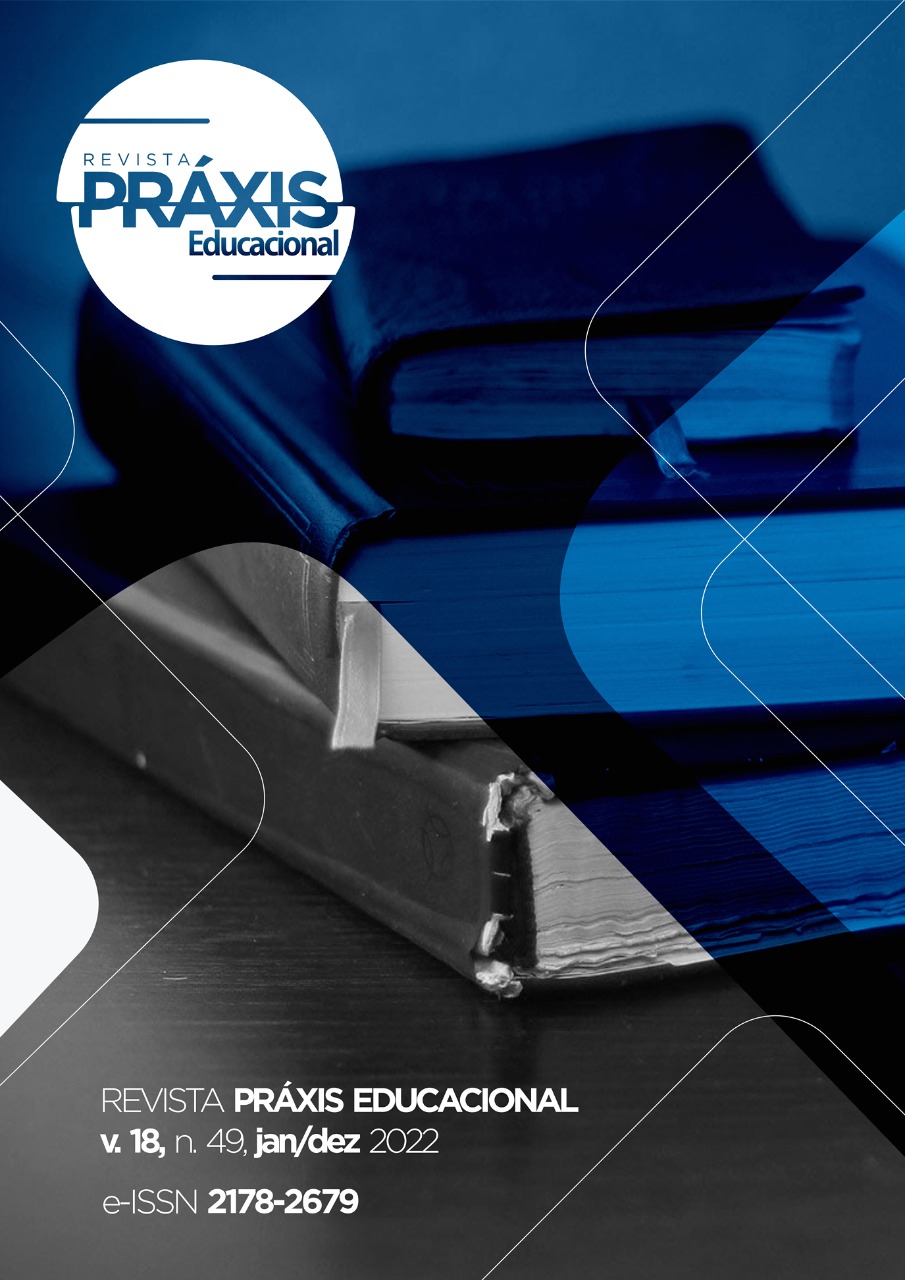Critical reading of internet memes in english language classes
DOI:
https://doi.org/10.22481/praxisedu.v18i49.11095Keywords:
critical reading, language, internet memesAbstract
Memes can be defined as small units of meaning transmitted and transformed from person to person in processes of copy and imitation (DÍAZ, 2013; DAWKINS, 1976). As time went by, the theories about memes were reviewed due to contemporary issues regarding technologies in society (SHIFMAN, 2014). In face of these aspects, we present and analyze documentary research (LAVILLE; DIONNE, 1999; FLICK, 2009) characterized as a data collection of memes and a didactic sequence in the context of English language classes. Our analyses were based on the perspective of critical reading and social justice (JORDÃO, 2017). As a result, we point out memes as potential resources for the establishment of critique in classroom since they can portray diverse realities.
Downloads
Metrics
References
BOA SORTE, Paulo; VICENTINI, Cristiane. Educating for social justice in a post-digital era. Práxis Educacional, [S. l.], v. 16, n. 39, p. 199-216, 2020.
BURWELL, Catherine. The Routledge Companion to media education, copyright, and fair use. USA: Routledge, 2018.
CETIC-BR. Tic Domicílios 2019: principais resultados. São Paulo: Comitê Gestor da Internet no Brasil, 2020a – Disponível em: https://cetic.br/media/analises/tic_domicilios_2019_coletiva_imprensa.pdf. Acesso em: 20 jan. 2022.
CETIC-BR. Tic Educação 2019: coletiva de imprensa. São Paulo: Comitê Gestor da Internet no Brasil, 2020b – Disponível em: https://www.cetic.br/media/analises/tic_educacao_2019_coletiva_imprensa.pdf. Acesso em: 20 jan. 2022.
COLLINS, Patricia Hill; BILGE, Sirma. Intersectionality. Malden: Polity Press, 2016.
DAWKINS, Richard. The selfish gene. Londres: Oxford University Press, 1976.
DENARDI, Didiê Ana Ceni. Didactic sequence: a dialectic mechanism for language teaching and learning. Revista Brasileira de Linguística Aplicada. Belo Horizonte, v. 17, n. 1, p. 163-184, mar. 2017.
DÍAZ, Carlos Mauricio. Defining and characterizing the concept of Internet Meme. Revista CES Psicología, v. 2, 82-104, 2013.
DONGQIANG, Xie; SERIO, Ludovico de; MALAKHOV, Alexander; MATYS, Olga. Memes and Education: opportunities, approaches and perspectives. Geopolitical, Social Security and Freedom Journal, v. 3, n. 2, 2020.
FLICK, Uwe. Introdução à pesquisa qualitativa. Porto Alegre: Artmed, 2009.
GLĂVEANU, Vlad Petre; SAINT-LAURENT, Constance; LITERAT, Ioana. Making sense of refugees online: Perspective taking, political imagination, and Internet memes. American Behavioral Scientist, v. 62, n. 4, p. 440-457, 2018.
HARTMAN, Pamela; BERG, Jessica; FULTON, Hannah; SCHULER, Brandon. Memes as Means: using popular culture to enhance the study of Literature. The Journal of the Assembly for Expanded Perspectives on Learning, v. 26, p. 65-82, 2021.
JENKINS, Henry. Cultura da convergência. Tradução de Susana Alexandria. São Paulo: Aleph, 2009.
JORDÃO, Clarissa Menezes. Birds of different feathers: algumas diferenças entre letramento crítico, pedagogia crítica e abordagem comunicativa. In: TAKAKI, Nara Hiroko; MACIEL, Ruberval Franco (org.). Letramentos em terra de Paulo Freire. Campinas, SP: Pontes, 2017.
JORDÃO, Clarissa Menezes.; FIGUEIREDO, Eduardo Henrique Diniz de; MARTINEZ, Juliana Zeggio. Trapacear a linguística aplicada com Pennycook e Makoni: transglobalizando norte e sul. Trabalhos em Linguística Aplicada, Campinas, SP, v. 59, n. 1, p. 834–843, 2020.
KALANTZIS, Mary; COPE, Bill. Adding sense: context and interest in a grammar of multimodal meaning. New York: Cambridge University Press, 2020.
KAYALI, Nurda Karadeniz; ALTUNTAS, Ash. Using memes in language classroom. Shanlax International Journal of Education, v. 9, n. 3, p. 155-160, 2021.
KNOBEL, Michele; LANKSHEAR, Colin. Online memes, affinities, and cultural production. In: KNOBEL, Michele; LANKSHEAR, Colin (org.). A New Literacies Sampler. New York: Peter Lang Publishing, 2007, p. 199-227.
LAVILLE, Christian; DIONNE, Jean. A construção do saber: manual de metodologia da pesquisa em ciências humanas. Tradução de Heloísa Monteiro e Francisco Settineri. Porto Alegre: Artmed, 1999.
LUKE, Allan. Critical literacy: Foundational notes. Theory into practice, v. 51, n. 1, p. 4-11, 2012.
MATIAS, Keno Ivan. Integration of internet memes in teaching social studies and its relation to the development of critical thinking skills: a literature review. Global Scientific Journals, v. 8, n. 2, dez. 2020.
MENEZES DE SOUZA, Lynn Mário Trindade. Glocal languages, coloniality and globalization from below. In: GUILHERME, Manuela; MENEZES DE SOUZA, Lynn Mário Trindade (org.). Glocal languages and critical intercultural awareness: The south answers back. New York: Routledge, 2019, p. 17-41.
MENEZES DE SOUZA, Lynn Mário Trindade; MONTE MÓR, Walkyria. Still Critique? Revista Brasileira de Linguística Aplicada, v. 18, n. 2, p. 445-450, 2018.
POLLOCK, Tom. The difference between structured, unstructured and semi-structured interviews (2019). Disponível em: https://www.oliverparks.com/blog-news/the-difference-between-structured-unstructured-amp-semi-structured-interviews. Acesso em: 25 jan. 2022.
REDDY, Rishabh; SINGH, Rishabh; KAPOOR, Vidhi; CHURI, Prathamesh. Joy of learning through internet memes. International Journal of Engineering Pedagogy, v. 10, n. 5, p. 116-133, 2020.
REIS, Sônia Maria Alves de Oliveira. Paulo Freire: 100 anos de práxis libertadora. Práxis Educacional, [S. l.], v. 17, n. 47, p. 238-258, 2021.
ROMERO, Mary. Introducing Intersectionality. Malden: Polity Press, 2018.
SHIFMAN, Limor. Memes in digital culture. USA: The MIT Press, 2014.
SILVA, Nayara Stefanie Mandarino; NUNES, Thainná Melo. Memes na formação inicial de professores de inglês. EntrePalavras, Fortaleza, v. 11, n. 1, p. 1-23, jan./abril 2021.
Downloads
Published
How to Cite
Issue
Section
License
Copyright (c) 2022 Práxis Educacional

This work is licensed under a Creative Commons Attribution-ShareAlike 4.0 International License.
You are free to:
Share - copy and redistribute the material in any medium or format; Adapt - remix, transform, and build from the material for any purpose, even commercially. This license is acceptable for Free Cultural Works. The licensor cannot revoke these freedoms as long as you follow the terms of the license.
Under the following terms:
Attribution - You must appropriately give credit, provide a link to the license, and indicate if any changes have been made. You may do so in any reasonable way, but not in a way that suggests that you or your use is endorsed by the licensor.
There are no additional restrictions - You cannot apply legal terms or technological measures that legally restrict others to make any use permitted by the license.










